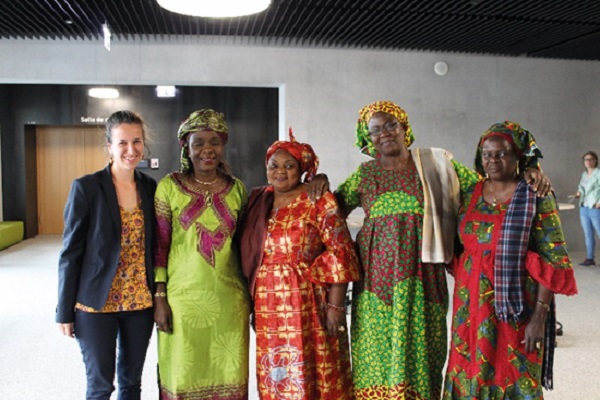 "Intersections" information evening with Senegalese professor Fatou Sow Sarr;
Credit: Fondation Follereau Luxembourg
"Intersections" information evening with Senegalese professor Fatou Sow Sarr;
Credit: Fondation Follereau Luxembourg
Fondation Follereau Luxembourg published its annual report for 2018 at its General Assembly held on 29 May 2019; this report reflected on the projects the foundation has carried out in nine African countries as well as its awareness activities in the Grand Duchy.
For more than 50 years, the Fondation Follereau Luxembourg has dedicated its activities to improving the living conditions of people suffering from forms of exclusion. Initially focused on supporting people with leprosy, it now encompasses a broader cooperative action, centred around two major causes: the improvement of health ("Health is Wealth") and supporting young people ("Let kids be kids").
As mentioned by Jean Hilger, President of Fondation Follereau Luxembourg: "one does not choose where one is born, but every person has the right to live with dignity and safety". In order to improve the daily lives of hundreds of thousands of women, men and children, the Follereau Luxembourg Foundation consolidated its activities in 2018, alongside its partners in the field.
Projects supported by the foundation are carried out by trusted local partner associations, in order to ensure the sustainable and quality execution of projects corresponding to the needs of the targeted local populations.
As part of the "Health is Wealth" project, the foundation set up new health centres and maternity units as needed in Mali, Burkina Faso and Togo in order to strengthen access to care for the poorest populations, including women and children. In Mali, for example, the Kolodougou centre (operational since the second quarter of 2018) has already recorded 259 births. Meanwhile, in Togo, the foundation installed 100 hand-washing devices and 20 sheds in schools and public places to promote health education in target villages.
In an approach to sustainable and effective development, this is in addition to awareness-raising and skill-building activities aimed at providing the population with the means to gradually live completely autonomously. Community awareness and training of community health workers have proved particularly critical in the prevention of neglected tropical diseases (NTDs), such as leprosy or Buruli ulcer.
Similarly, awareness and the active inclusion of all actors in society are fundamental in the fight against female genital mutilation (FGM) in Burkina Faso and Mali. Indeed, the foundation held two awareness days in Mali, during which 200 grandmothers (influential in the preservation of traditions) received training and gained awareness. In addition, thanks to the physical and psychological repair activities of women who suffered the consequences of FGM, 70 Burkinabe women received care and were able to return to their village in 2018.
For its part, the "Let kids be kids" project, committed to more than 23,000 young people, saw 27 of 28 apprentices successfully complete their training at the Professional Training Centre in Zè, Benin. Indeed, projects in Benin and the Ivory Coast for particularly vulnerable children proved successful in 2018. For instance, in Benin, thanks to the collaboration with local NGOs PIED and APEM, 140 children aged 7 to 17 have been saved from trafficking in the north of the country and received food, health, psychosocial care and shelter. In addition, the Centre for Integration and Social Promotion for the Home of Disabled Children (CIPSA-EH) cared for 53 children excluded from the regular school system due to illness and/or hospitalisation.
Moreover, in Bouaké in the Ivory Coast, the Maison de l'Enfance welcomed 86 young people in 2018, 30 of whom were in boarding school. The emphasis was placed on the re-schooling of these children, of which 63 were able to be reunited with their families after multiple awareness and therapy sessions.
At the Luxembourg level, the Ministry of Foreign and European Affairs renewed its support for the foundation's outreach activities earlier this year through a new multi-year framework agreement for sustainable development education. These activities are carried out in Luxembourg, often in partnership with schools, in the form of educational workshops. Their primary objective is to raise awareness among participants on the various themes of the foundation's areas of intervention and has 17 Sustainable Development Goals (SDGs), as set out in the Agenda 2030 of the United Nations.
Throughout 2018, the foundation organised several awareness and information events related to the activities, including the screening of the film "Ouaga Girls" and the educational evening "Intersections", during which Senegalese professor Fatou Sow Sarr gave a presentation on the successes and challenges of African women's movements.








